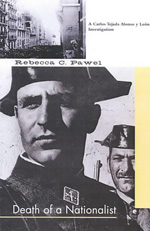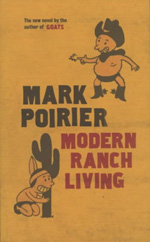
Colds are never pleasant, but thankfully I had a selection of Brian Michael Bendis comic books to cheer me up. This stash had been sitting on the shelves for some months, awaiting the right moment for devouring, and I was glad Iíd left them to marinate. I kicked off with Fortune and Glory, which is a marvellously humorous and biting critique of the Hollywood scene, documenting as it does Bendisí experiences of having his ace Goldfish comic book developed into a movie proposal in the late Ď90s. Filled with the kind of terrific dialogue you expect of a Bendis comic and drawn with a fittingly stylised cartoon style, Fortune And Glory is wonderfully knowing and self-referencing without ever coming across as either self-congratulatory or too self-effacing. And you know itís a damn shame that the Goldfish movie never came to fruition, because it could have been so good, although I have to admit that the movie of the Torso comic book that Bendis wrote with Marc Andreyko and whose pitching to the studios is featured in the book would have been even better. Like The Untouchables meets Seven, it could have been dynamite. We can only dream.
Bendisí Fire would equally make a great spy movie, like Mission Impossible meets John Le Carre meets Pulp Fiction. Possibly. This version by Image Comics is a re-jigged version of the mid-Ď90s publication, and the inclusion of a couple of Ďbefore and afterí page images alongside Bendisí commentary on the project are very welcome additions that display the honing of his skills in the intervening six years or so. And again here, alongside his natural ability to spin a terrific yarn, itís Bendisí exuberantly creative use of panels that really makes this book special.
Creative panelling is evident again in his Alias title for Marvel. Now Iíve never been a great Marvel fan, and I have little to no interest in Bendisí work on Daredevil or Spiderman, but something about the premise of Alias nevertheless appeals. Itís to do with the idea of Superheroes as fallen stars and fallible icons, a premise that permeates the brilliant Powers series of course (and that found threads in The Incredibles, a movie that owed more than a nod to Bendisí great series, though clearly given a Hollywood sugar coating) and that flows fully through Aliasí Noir tales of Jessica Jones, Private Investigator. Superhero Detective Noir might seem an unlikely collision of genres, and in anyone elseís hands it would likely be an ugly car crash (though credit to DCís ace Gotham Central title for doing similar things within the Batman universe), but Bendis has the skills to carry it off, and in this he is ably supported by Michael Gaydos who supplies the suitably gritty artwork. There are another three volumes out there, and Iím keen to pick them up.

Next out of the holiday bag were two novels by New York based high school teacher Rebecca Pawel. I kicked off with Death Of A Nationalist, which was as well since it is the first in what I hope will be an ongoing series set in immediate post-Civil War Spain and featuring the unlikely hero figure of Carlos Tejada Alonso y Leon. Now I first came across Death Of A Nationalist a couple of months ago on a trawl of the local Waterstonesí Crime section. I was drawn initially to its fine cover that sported a reproduction of W. Eugene Smithís famous photo of the Spanish Guardia Civil, and I noted too that it was published by the SOHO imprint responsible for the Willem van De Wettering novels that Kevin has recommended in the past. Iím glad that I left it on the shelf for a while though, because as cheesy as it sounds, it was perfect reading for under the Spanish sun. Now I mentioned that the Tejada character was an unlikely hero, and itís certainly one of the most appealing aspects of the book: how Pawel paints her characters in strokes that reveal their contradictions, that indeed make those contradictions become the essence of what is ultimately so interesting about them. The plot is involved but never convoluted (murder, execution, revenge and love all play their part), and revolves around the political extremes of the bookís context which comes across as convincingly researched. The cover proclaims that it was selected as Ďa Best Mystery of 2003í by Publishers Weekly, and itís hard to argue against that. Certainly itís a book that carries the spark of something intriguing and it marks Pawel as a name to jot in your notebooks.

The last two books to see the light of the Spanish sun were a couple of titles by writers Iíve indulged in the past to great effect. Firstly there was Newton Thornburg, perhaps best known for his wonderful Cutter And Bone that formed the basis for the 1981 movie Cutterís Way. Iíd previously read that, and his classic debut To Die In California and been hugely impressed, so it was a hefty dose of expectation that I dove into his 1983 novel Dreamland. Iím glad to say that those expectations were at least reached, and Dreamland has joined Thornburgís other two titles on my theoretical top shelf; this despite (or possibly because of, I canít decide) Renoís character being played out in my head as a teenage Jodie Foster (though Natalie Woodís Daisy Clover might have been a good bet too). George P. Pelecanos is a Thornburg fan too, so donít just take my word for it.
The other writer in question was Mark Poirier, whose debut novel Goats I had enjoyed enormously some years ago, and whose Naked Pueblo collection showed how short story writing ought to be done. And Iím pleased to report that his recent Modern Ranch Living novel is every bit as good as whatís gone before. Set, like Goats, in a sun blasted Arizona summer, Modern Ranch Living is a study of mildly dysfunctional lives and the flurries that ebb between them, drawing them together in ways that are both fleeting and concrete. In the process Poirier, in manner not unlike Douglas Coupland, documents contemporary cultural life in a manner that is both sympathetically involved and yet observationally detached. His characters are naturally flawed and utterly believable; sixteen year old body builder Kendra in particular is magically alive and made me want to go back and check out Sam Fussellís brilliant Muscle. With this book Poirier has quietly marked himself out as one of the most interesting contemporary American novelists, and I certainly am looking forward to reading more. I just hope either he or his publisher has the sense to exercise some restraint and does not allow the possibility of self-indulgence to spoil what promises to be a splendid future.
Now, whenís the next holiday?
© 2005 Alistair Fitchett